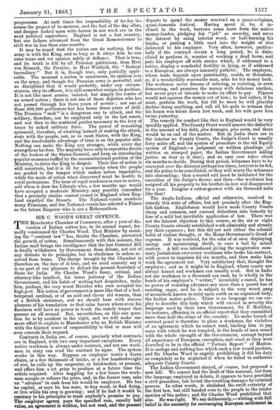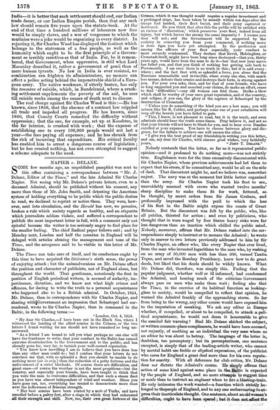SIR C. WOOD'S GREAT OFFENCE. T HE Manchester Chamber of Commerce,
after a year of dis- cussion of Indian cotton has, in its annual report, for- mally condemned Sir Charles Wood. That Minister by resist- ing the " contract law " has, thinks the Chamber, prevented the growth of cotton. Simultaneously with this censure, the Indian mail brings the intelligence that the last Contract Bill is finally withdrawn by Government from debate, not out of any distaste to its principles, but in obedience to orders re- ceived from home. The charge brought by the Chamber is • .therefore on the face of it true, and we need scarcely say it is no part of our pleasure to defend the present Secretary of State for India. Sir Charles Wood's fussy, critical, and attorney-like intellect, his inane jealousy of the Indian 'Government, and his habit of writing tart despatches, make him, perhaps, the very worst Minister who ever occupied his ugh post. His notion of government is more like that of a bad- tempered cardinal, or of an acid and clever old woman, than of a British statesman, and we should hear with sincere pleasure of his translation to that calm haven where even his fussiness will have no power to break the stately torpor that presses on all around. But, nevertheless, on this one ques- tion he is by accident in the right, and we will make one more effort to explain to Manchester why no British Minister with the faintest sense of responsibility to God or man will .ever concede their request. Contracts in India are, of course, precisely what contracts are in England, with two very important exceptions. Every native workman is always under contract, and not one work- man in sixty can read the contract he signs. The system works in this way. Suppose an employer wants a dozen chairs, or a few thousands of bricks, or a few hundredweight .of rice, he calls up the carpenter, or brickmaker, or peasant, and offers him a set price to produce at a future time the -article required. After haggling for a few hours the work- man accepts or refuses the price, and, in the former case, asks an "advance" in cash from his would-be employer. He has no capital, or says he has none, to buy wood, or find firing, or live while his crop is growing; and if he had it would be contrary to his principles to trust anybody's promise to pay. The -employer agrees, pays the specified sum, usually half value, an agreement is written, but not read, and the peasant departs to spend the money receivel on a quasi-religious, quasi-domestic festival. Having spent it, he, if in- clined to the work, borrows some more from the native money-lender, pledging his " job" as security, and saves the interest by using inferior wood, or half-burning his bricks, or putting a little sand into the weight of rice delivered to his employer. Very often, however, particu- larly if the contract covers a long period, he is disin- clined to perform it, wearies of working a dead horse, and puts his employer off with stories which, if addressed to a native, display a wonderful fertility in lying, or if addressed to a European, are always intensely pathetic. The employer, whose trade depends upon • punctuality, scolds, or threatens, or, if a wonderfully reasonable man, asks for his money back. The workman never dreams of refusing, or resisting, or even demurring, and promises the money with delicious unction, but never pays or intends to make an effort to pay. Pincers would not squeeze the money out of him ; he had rather, if he must, perform the work, but till he must he will placidly decline doing anything, and call all his gods to witness that his house was burnt down last week, and his wife gave him twins yesterday.
The remedy for conduct like that in England would be very speedily applied. The County Court would amerce the defaulter in the amount of his debt, plus damages, plus costs, and there would be an end of the matter. But in India there are in the interior no County Courts, the Judge's Court is usually forty miles off, and the system of procedure is the old Equity system of England—a judgment on written pleadings (all written on stamped paper, the Indian Government selling justice as dear as it dare), and an easy case takes about six months so decide. During that period, witnesses have to be conveyed over the distance perhaps ten times, lawyers to be fed, and the police to be conciliated, or they will worry the witnesses into absconding ; then a second suit must be instituted for the execution of the Judge's decree, and then—the workman has assigned all his property to his brother-in-law and disappeared for a year. Imagine a cotton-grower with six thousand suits like that!
The Anglo-Indians, official and otherwise, resolved to remedy this state of affairs, but not precisely after the Eng- lish fashion. Englishmen would have made County Courts cheap and common, and coerced defaulters into honesty by fear of a mild but inevitable application of law. There was not the faintest objection to this course, as the six or eight County Courts already established work admirably and already pay their expenses ; but this did not suit either the colonial habit of violent thought, or the Home Government's dread of expense. It was resolved, for the sake of at once displaying energy and maintaining thrift, to cure a boil by actual cautery. A bill was introduced giving the magistrates sum- mary jurisdiction over every workman who broke his contract, with power to imprison for six months, and then make him work the agreement out. Very satisfactory that, thought the employer; and so it might be in England, where courts are always honest and workmen can usually read. But in India not one workman in a thousand can read, he is wholly in the hands of his employer's " writer," invariably a rascal, he has no power of resisting advances any more than a parrot has of resisting sugar, and he is subject to the very worst gang of scoundrels known to exist upon earth as an organized body, the Indian native police. There is no language we can em- ploy to describe this body which will exceed in severity the language used by their own Government, Sir F. Halliday, for instance, affirming is an official report that they committed more than half the crime of the country. To make breach of contract penal is therefore to place a workman, for violation of an agreement which he cannot read, binding him to pay sums with which he was tempted, in the hands of men armed with the whole strength of the Government, corrupt beyond all experience of European corruption, and cruel as they were described to be in the official "Torture Report" of Madras. It is serfage and nothing less which such a law would produce, and Sir Charles Wood in angrily prohibiting it did his duty as completely as he neglected it when he failed to authorize adequate County Courts. The Indian Government obeyed, of course, but proposed a new bill. We cannot find the draft of this measure, but from the language employed in debate, it appears to have provided a civil procedure, but levied the resulting damages by criminal process. In other words, it abolished the swift certainty of the find law, but still handed over to the people to the tender mercies of the police; and Sir Charles Wood prohibited that also. He was right. We say deliberately,—writing with full belief in the necessity for encouraging European settlement in India—it is better-thatzuch settlement should end; our-Indian
trade decay, or our Indian Empire perish, than that any such law should remain five years upon the statute-book. At the end of that time a hundred millions of labourers now free would be simply slaves, and a war of vengeance to which the mutinies were a joke would be organizing in every district. In rejecting it, Sir Charles Wood has displayed the instinct which belongs to the statesman of a free people, as well as the humanity which ought to be the first principle of a Govern- ment so terribly resistless as that of India. For, be it remem- bered, that Government, when oppressive, is still what Lord Macaulay described it, rather a government of genii than of mere human tyrants. No law in India is ever resisted, no combination can frighten its administrators, no menace can affect a police acting behind the impenetrable shield of a Euro- pean army. The native workman, if utterly beaten, has only the resource of suicide, which, in Bundelcund, where a crush- ing settlement supplements the poverty of the soil, he uses till suicide ranks among the causes of death next to disease.
The real charge against Sir Charles Wood is this :—He has known, since 1850, that the absence of a contract law crippled all trade and impeded all progress. He has known, since 1860, that County Courts remedied the difficulty without oppression ; that the one, for example, set up at Kooshtee, in the far interior, is crushed with work ; that the expense of establishing one to every 100,000 people would not last a year—the fees paying all expenses ; and he has shrunk from the risk of incurring that expenditure. His critical faculty has enabled him to arrest a dangerous course of legislation ; but he has created nothing, has not even attempted to suggest a scheme adequate to the need.































 Previous page
Previous page